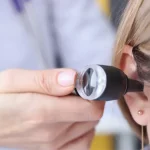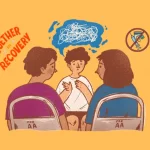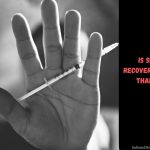
A person needs a long time to recover from an eating disorder. Not only do these illnesses require the expertise of a team of experts, but the patient also needs the love and support coming from her family and friends.
Most people who suffer from an eating disorder tend to feel uncertain about their progress. Some even think that their loved ones don’t support them as much as they want them to.
When a person feels such negative thoughts, it may lead them to feel uncertain, leading to other roadblocks that can hinder their progress.
Understanding the stages of change during the recovery process
The stages that a person needs to go through to recover from an eating disorder usually form a cycle, rather than a linear progression. Every person who has an eating disorder goes through five stages of change to complete their recovery.
Pre-contemplation stage
Patients start with the pre-contemplation stage. This is the point when a person still doubts that they have a problem. Usually, their closest loved ones are already noticing the symptoms.
They also see the changes in the patient’s appearance before the patient admits to a problem. During these times, the patient may refuse to discuss their condition or even talk about it.
If your loved one starts to show any signs of an eating disorder, it’s best to express your concerns to them.
Contemplation stage
The next stage that they’ll go through is the contemplation stage. This occurs when an individual is prepared to admit that they have a problem and is now keen on accepting help.
At this stage, the National Eating Disorders Association says that you need to learn as much as you can about the disorder. Let the patient share their thoughts and be open-minded about it.
Preparation stage
The preparation stage soon follows the contemplation stage. In the preparation stage, a person readily admits that he or she is ready for a change but doesn’t know where and how to start.
If you’re supporting someone who’s going through a recovery, it’s best to know your role in the process. You need to ask your loved one as well as the treatment team how you can help with the recovery process.
Action stage
The action stage starts when the person is willing to implement the treatment strategy and face their current situation. At this point, you need to ensure that your loved one follows the treatment team’s recommendations. You also need to remove any possible triggers that may cause them to relapse.
Maintenance stage
The last stage is the maintenance stage. It’s when your loved one now actively practices new ways of thinking and uses healthy coping skills. Be prepared to encourage them and provide support in everything they do.
Relapse and after-treatment

During these stages, Beat Eating Disorders says that relapse is possible. There are times when a person may have to go through entire stages more than once or revisit a few steps in the process.
In some cases, patients may have to visit several anorexia nervosa treatment centers and can experience recurrences of different stages in the process while at these centers. If that happens, it’s best to maintain constant positive communication with them so their efforts will not go to waste.
About The Author:
Stacey Smith is a freelance health writer. She is passionate about writing about women’s health, dental health, diabetes, endocrinology, and nutrition and provides in-depth features on the latest in health news for medical clinics and health magazines.




